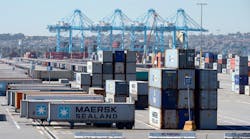Import cargo volume at the nation’s major retail container ports is expected to slow down in November following record levels in September and October as retailers rushed to bring merchandise into the country ahead of a possible shutdown of West Coast ports, according to the monthly Global Port Tracker report from the National Retail Federation and Hackett Associates.
“Retailers have done all they can to stock their shelves and build up inventories in case the worst should happen,” says Jonathan Gold, NRF’s vice president for supply chain and customs policy. “We believe it’s time for President Obama to send in a federal mediator and do what it takes to reach an agreement that will work to the benefit of not just labor and management but all the businesses and consumers who depend on these ports.”
Import volume at U.S. ports covered by the Global Port Tracker report is expected to total 1.4 million containers in November, down from 1.59 million each in September and October, a number that broke the previous monthly high of 1.52 million set in August. Cargo volume has been well above average each month since spring as retailers have imported merchandise early in case of any disruption on the docks.
The contract between the Pacific Maritime Association and the International Longshore and Warehouse Union expired on July 1, prompting concerns about potential disruptions that could affect holiday merchandise. The lack of a contract and other operational issues have led to crisis-level congestion at the ports in recent weeks, prompting concern of a shutdown. NRF and more than 100 other business groups last week asked President Obama to send a federal mediator to help with negotiations.
The 1.59 million twenty-foot equivalent units (TEUs) handled in September, the latest month for which after-the-fact numbers are available, was up 5.2% from August and 10.9% from September 2013. One TEU is one 20-foot cargo container or its equivalent.
October was estimated at 1.59 million TEUs, within about 3,000 containers of September’s level and up 11% from the same month last year. November’s forecast of 1.4 million TEUs would be up 3.9% from last year, and December is forecast at 1.36 million TEUs, up 3.3%.
Those numbers would bring 2014 to a total of 17.3 million TEUs, an increase of 6.4% over 2013’s 16.2 million. Imports in 2012 totaled 15.8 million. The first half of 2014 totaled 8.3 million TEUs, up 7% over last year.
January 2015 is forecast at 1.42 million TEUs, which would represent a 3.1% increase from January 2014, February at 1.35 million TEUs, up 8.4% from last year, and March at 1.33 million TEUs, up 2.3%.
The import numbers come as NRF is forecasting 4.1% holiday season sales growth and 3.6% growth for 2014 overall. Cargo volume does not correlate directly with sales but is a barometer of retailers’ expectations.
“September was a bumper crop well above even our own expectations,” says Ben Hackett, founder of consulting firm Hackett Associates. “Despite all the delays, vessels do continue to berth and discharge their cargo.”



